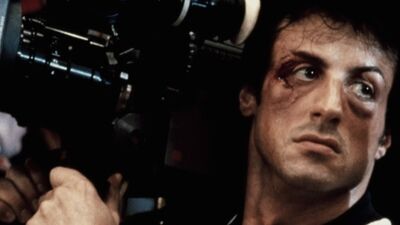Elsewhere, “Sly” is a frustratingly unrealized work, always hovering on the edge of real insight but rarely jumping into it. It was smart of Zimny to put Stallone front and center and let him essentially hold court, guiding the audience through his life with the same affable, eloquent, man-of-the-people energy that he brought to so many talk show appearances over the years. But the downside of that access is a film that often seems to sand the rough edges off both Stallone and his movies. Stallone was an uncouth palooka punchline for legacy Hollywood and the snarkier parts of journalism, which had to hurt (and seems even more grossly unfair now than it did back then), but “Sly” barely touches on that, except to let Stallone and other interviewees call him an outsider without delving into what the word means in context of an Italian-American New Yorker with a speech impediment who suddenly became rich and famous without learning how to be smooth and classy first. Nor is there much in here about any of Stallone’s marriages (save his third, which is ongoing) and not much about his children, except for Sage Stallone, who died tragically and unexpectedly in 2012.
You can’t quite call “Sly” a deep dive into the work, either, unfortunately. It spends much of its first half getting to the original “Rocky” and sprints through most of the rest, with pauses for highlights like the “Rambo” films and “Copland.” And it elides some aspects of what Stallone’s career, in a larger sense, meant to 20th-century America. He was a poster boy for certain mindsets. It seems hard to imagine today with Rocky defined for younger generations as “Unc,” the crusty old mentor of Donnie Creed in the “Creed” series, and jocular action figure Barney Ross in the “Expendables” franchise, but the “Rocky” movies in the ’70s and ’80s were “issues” as well as films, as discussed for their racial politics as for their dramatic achievements. The “Rambo” series, meanwhile, started out as a wilderness survival tale with a traumatized Vietnam vet as its hero and hippie-hating backwoods cops and National Guardsmen as its antagonists, then took a reactionary right turn in 1985 with the second entry in the series, a P.O.W. rescue fantasy wherein Rambo killed bushels of Vietnamese and dozens of Russians. The “Rocky” series joined Rambo in Reagan-land that year with “Rocky IV,” which pitted Rocky against a gigantic, scowling blonde Soviet who seemed to have stepped out of a James Bond movie.
Throughout most of the next 15 years, Stallone became the anti-Springsteen, incarnating white ethnic grievance and reactionary fervor and joining Schwarzenegger, Clint Eastwood, and Bruce Willis in stumping for right-wing politicians. A 1985 Newsweek cover story headlined “Showing the Flag: Rocky, Rambo, and the Return of the American Hero” anointed him as the successor to John Wayne. It would have been fascinating to hear Stallone talk about all this with his customary eloquence, humor, and self-deprecating insight, but “Sly” doesn’t so much avoid politics as duck them, like Rocky avoiding a haymaker. (I’d bet good money that two of Zimny’s key interviewees, New York Times culture writer Wesley Morris and writer/director Quentin Tarantino, had plenty to say on all of these topics, whether or not Zimny asked for their opinions.)

